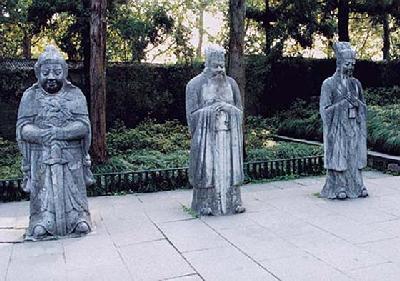 |
| stone figures in Mausoleum of General Yue Fei |
The Mausoleum of General Yue Fei was located in Yue Fei's temple at the south foot of Xixia Mountain of Hangzhou City in Zhejiang Province.
Yue Fei (1103-1142) was born in Tangyin of Xiangzhou (in today's Henan Province). He was a great national hero of the Southern Song dynasty (1127-1279) who distinguished himself in battles against northern invaders. During the 12th century, when Jurchen invaders from the north attacked China, General Yue Fei was commander of the Song armies. His attempt to push north and recover all the lost Chinese territory was opposed, however, by a peace party within the capital headed by the minister Qin Hui, who believed that further prosecution of the war would be too costly. Qin Hui's faction proved more influential, and in 1141 Yue Fei was recalled to the Song court and imprisoned. Later he was executed after being framed by Qin Hui.
In 1163, Song Emperor Gaozong exonerated Yue Fei and had his corpse reburied at the present site. In 1221, a memorial temple of Yue Fei was built here with statue of Yue Fei enshrined inside.
The memorial temple has been destroyed and rebuilt for several times. The present structure was the product of the restoration in 1923. It contains a 4.54-meter-high statue of Yue Fei, which shows him armed with a sword in the left hand, seemingly prepared to fight at all times. A calligraphy work of Yue Fei reading "return the mountains and rivers to us" is hung on the wall, being a reference to his patriotism and resistance to the Jurchen. In the two side halls of the temple are 120 tablets; the tablets are engraved with Yue Fei's poems as well as eulogies to him by noted figures.
To the right of memorial temple is the mausoleum of Yue Fei. Four iron statues: Qin Hui and his wife, Zhangjun and Mo Qixie are kneeling in front of the tomb, all cursed and spat by visitors for their guilt. On both sides of the tomb are six stone figures, two horses, two tigers and two goats, symbolizing the guards of Yue Fei.
